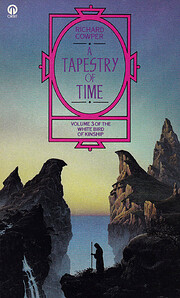

Click on a thumbnail to go to Google Books.
|
Loading... A Tapestry of Timeby Richard Cowper
 None No current Talk conversations about this book. Cowper brings this series to a close with more society-building that the publishers insist on making look like fantasy. In fact, half the book is an examination of the whole story from the point of view of an academic in the story's future reconstructing the tale from old documents, in a society rebuilding itself to early-19th century levels (some of the characters marvel at the new gas street lighting). no reviews | add a review
No library descriptions found. |
Current DiscussionsNonePopular covers
 Google Books — Loading... Google Books — Loading...GenresMelvil Decimal System (DDC)823.914Literature English & Old English literatures English fiction 1900- 1901-1999 1945-1999LC ClassificationRatingAverage: (3.46) (3.46)
Is this you?Become a LibraryThing Author. |
|||||||||||||||||||||||||||||||||||||||||||||||||||||||||||||||||||||||||||||||||||||||||||||||||||||||
It's not more stars because of two thematic contradictions over the entire trilogy. The first is parochialism. For a series about a possible transcendence for mankind, we never see anything other than England and a touch of Western Europe. The other is social stagnation. For a series about change, there is never any serious explanation for why society remains in a cozy pre-industrial setting for almost 2000 years.
That said, there is so much that I admire in Tapestry. It is challenging to say what without spoilers for the series as a whole.
Table stakes for any series of course is to resolve the main arc. In this case, that arc is about the dream of Kinship for mankind, and Tapestry most definitely resolves that arc. It does so in a way that was not close to what I expected, but was true and uncontrived. Like the other two books, normal narrative structure for a genre novel was violated, but this time it worked, unlike the electronic out of body experience storyline that ran through the first book, or the long info-dump essay on social change that interrupted the middle of the second book.
Many series with large cosmic themes try to evoke the unimaginable final paradigm shift with incomprehensible fireworks, like the climax to one of those superhero movies -- a lot of action and speeches but not much sense. Tapestry does exactly the opposite.
Many series become hagiographies of their fictional central figures, or, in a few cases, resort to some violent turnabout in their development. This trilogy constantly surprises in how it avoids both pitfalls in dealing with the simple human nature of its protagonists.
Highly recommended. As the author notes in a preface, you must start from an edition of The Road to Corlay with Piper at the Gates of Dawn included. (